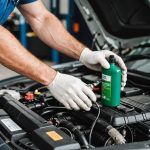When it comes to maintaining your car, understanding its electrical system is crucial. Your vehicle relies heavily on various electrical components to function properly. From the battery to the alternator, each part plays a vital role in keeping your engine running smoothly. Unfortunately, common problems can arise in the electrical system, leading to frustrating situations such as a dead battery or malfunctioning lights. In this article, we will explore how you can identify and repair these issues, ensuring your vehicle remains in top condition.
Understanding the Vehicle Electrical System
Every vehicle operates on a complex electrical system that consists of numerous components. At its core, the battery stores energy, which powers the entire system. This energy is then distributed via wiring to various parts of the vehicle, such as the starter, lights, and ignition system. The alternator plays a critical role by recharging the battery while the engine is running, ensuring that there is always sufficient voltage for operation.
Additional reading : How can you improve your car’s fuel efficiency without sacrificing performance?
To fully grasp how to diagnose problems, it is essential to know the main parts of this system. The fuse box safeguards the electrical system against overload by housing various fuses that protect specific circuits. If you experience any issues, checking the fuses should be one of your first steps. A blown fuse can often be the reason why your headlights won’t turn on or why the radio suddenly stops working.
Additionally, the wiring throughout your vehicle is pivotal. It’s responsible for routing electricity to and from various components. Damaged or corroded wiring can cause intermittent problems that can be difficult to trace. Regular inspections of the wiring can help prevent larger issues down the road. Understanding these components will empower you to tackle any electrical challenges your vehicle may present.
Also to discover : How can you tell if your car needs a professional inspection or if it’s a simple fix?
Diagnosing Electrical Problems in Your Vehicle
Identifying electrical problems can sometimes feel daunting. However, knowing what to look for can simplify the process significantly. One of the most common issues drivers face is a dead battery. This can happen for a variety of reasons, including leaving lights on or an old battery that needs replacing. A good first step is to check the battery connections to ensure they are tight and free of corrosion. If the connections look fine, you may want to use a voltage tester to assess the battery’s charge level.
If your vehicle won’t start at all, the problem may lie with the fuses or the alternator. A quick inspection of the fuse box can reveal blown fuses that need replacement. If your fuses are intact, you should check the alternator. If it is malfunctioning, it may not be charging your battery effectively. Signs of a failing alternator include dimming lights while driving or a battery warning light appearing on your dashboard.
Moreover, if you experience dimming or flickering lights, it often points to an issue with the wiring. Loose or exposed wires can create resistance that affects the flow of electricity. Start by visually inspecting the wiring for any signs of wear or damage. A multimeter can also help diagnose circuit problems by measuring the voltage at various points in the system. With these diagnostic steps, you can pinpoint the source of your electrical problems.
Common Electrical Issues and Their Solutions
There are several common problems associated with vehicle electrical systems, each with straightforward solutions. One of the most prevalent issues is a dead battery. If you find yourself in this situation, jump-starting the battery can often provide a quick fix. However, if the battery frequently dies, consider replacing it altogether as it may have reached the end of its lifespan.
Another frequent issue is malfunctioning lights. If your headlights or taillights are not working, start by checking the fuses related to these lights. If the fuses are in good condition, replace the bulbs. In cases where the lights flicker or dim, inspect the wiring for corrosion or loose connections.
Issues with the alternator can also create significant problems. If you notice strange noises or your battery warning light is illuminated, get your alternator checked. If it’s not functioning correctly, it may need a simple repair or complete replacement.
Lastly, problems with the circuit can disrupt the entire electrical system. If you’ve checked the battery, fuses, and alternator without finding any issues, consider doing a thorough inspection of the wiring and connections throughout your vehicle. Look for any signs of fraying or damage, and ensure all connections are tight. By addressing these common issues proactively, you can keep your vehicle’s electrical system running smoothly.
When to Seek Professional Help
While it’s beneficial to understand your vehicle’s electrical system, there are times when seeking professional assistance is necessary. If you encounter complex issues that you cannot diagnose or repair on your own, it’s best to consult a qualified mechanic. They possess the specialized tools and knowledge required to handle intricate electrical problems that may not be immediately apparent.
Additionally, if your vehicle experiences recurrent electrical problems despite your efforts to fix them, this could point to more serious underlying issues within the system. Professional mechanics have the experience to conduct thorough diagnostics, ensuring that all elements of the system are functioning correctly.
Moreover, if your vehicle’s electrical problems are affecting your safety—such as malfunctioning lights or a failure to start—it’s crucial to get professional help immediately. Delaying repairs in these situations could lead to dangerous conditions on the road.
Though self-diagnosis and simple repairs can save you time and money, knowing your limits is vital. Professional automotive repair services can offer peace of mind, ensuring that your vehicle remains safe and reliable.
Understanding and fixing common electrical issues in your vehicle can be incredibly rewarding. By familiarizing yourself with the electrical system, you can effectively identify problems such as a dead battery, faulty alternator, or damaged wiring. Regular maintenance and inspections can prevent many issues, allowing you to enjoy a trouble-free ride.
If you encounter issues that exceed your expertise, don’t hesitate to seek professional help. Proper maintenance and timely repairs will ensure your vehicle remains in peak condition for years to come. Remember, a well-functioning electrical system is essential for the overall performance and reliability of your vehicle.











